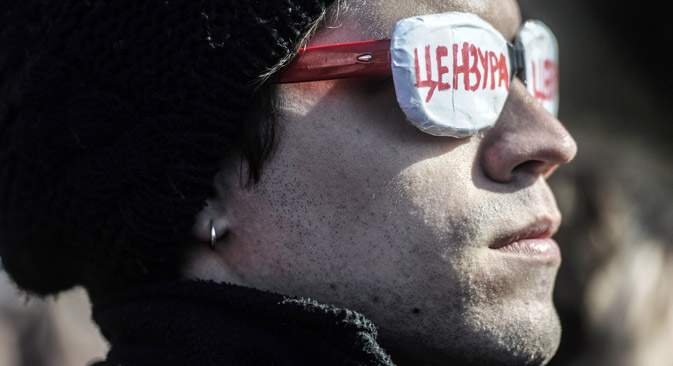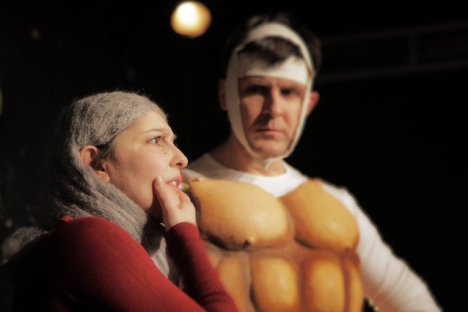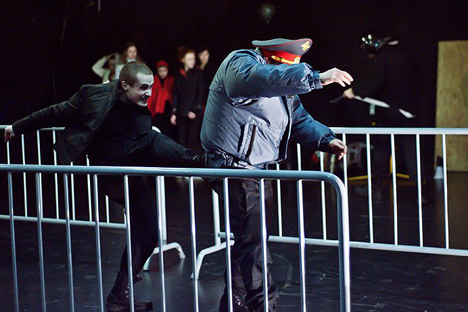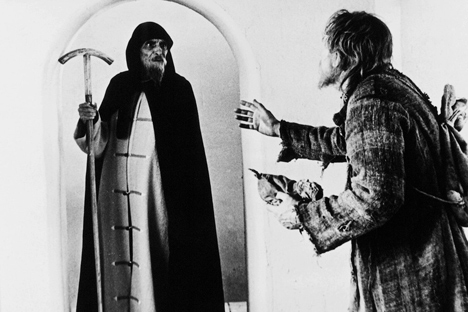
Participant of the rally "For the Freedom of Art" on Lenin Square in Novosibirsk, April 5, 2015. Source: Evgeny Kuskov / TASS
Earlier this year, Russia was shaken by an event the like of which it had never seen before – the director of an opera was taken to court by an Orthodox cleric.
Timofei Kulyabin, whose version of Wagner's opera Tannhauser was being staged at the Novosibirsk Opera and Ballet Theater, was accused by Metropolitan Tikhon, the head of the Orthodox Church in the region, of "improper use of religious symbols" and offending the rights of believers.
Kulyabin had adapted the plot of opera Tannhauser to the modern era, making the knight Tannhauser a film director shooting a film about Christ in Venus's grotto. The court acquitted Kulyabin, but nevertheless, the Ministry of Culture decided to dismiss theater producer Boris Mezdrich, despite protests from prominent Russian cultural figures.
The Tannhauser
case is a worrying example of the increasing degree to which the state and the religious
community are now interfering in the cultural sphere in Russia, often using
legislation passed in the wake of the Pussy Riot scandal of 2012, in which three
members of the controversial feminist punk group performed a song protesting
about the complicity of church and state in modern Russia in Moscow’s Christ
the Savior Cathedral. Following the incident, for which Nadezhda Tolokonnikova, Maria Alyokhina and Yekaterina Samutsevich were sentenced to two years in prison for "hooliganism
motivated by religious hatred,” a law was passed making it a criminal offense to
publicly insult the feelings of religious believers..jpg)
From left: Soloist of the Royal Danish Opera Stig Anderson in the role of Tannhauser, Irina Churilova as Elizabeth and Pavel Jankowski as Wolfram von Eschenbach in Richard Wagner's opera Tannhauser directed by Timofey Kulyabin on the stage of the Novosibirsk State Opera and Ballet Theatre. Source: Alexander Kryazhev / RIA Novosti
In the days of the USSR, government propaganda was clear in defining the borders of what was permissible. Productions of Soviet dramas and Russian classics were welcome, and the only “correct” approach was the Stanislavsky method. Dissident theaters were closed and some directors, such as Vsevolod Meyerhold, were shot.
Even during Khrushchev's "thaw" the productions from the famous Taganka Theater were banned, while director Yuri Lyubimov was labeled as "anti-Soviet" and deprived of citizenship. During the perestroika era a wave of freedom flooded Russia: Foreign theaters embarked on tours of the country, while directors started staging western literature and contemporary dramas, modernizing the theatrical language.
Recently, it seems that conservative political moods have been trying to return the country to the times of stagnation. State cultural institutions are being formed in accordance with the new official ideology. And even though the Russian Constitution forbids censorship, in practice the situation is completely different.
A vivid example of political pressure is the persecution of Moscow's independent Teatr.doc. The theater has staged a number of provocative plays: one on lawyer Sergei Magnitsky, who died in a Moscow prison in 2009 after exposing a huge fraud case involving Russian officials, and a satirical work by Dario Fo, BerlusPutin.

Moscow's theatre mocks "BerlusPutin", 2012. Source: Press Photo
At the end of last year the theater was evicted from its tiny basement. Letters of support, including one from British playwright Tom Stoppard, did not help. But the theater did not give up: It found new premises and came out with the play The Bolotnaya Affair, about the ever-expanding case against demonstrators arrested after public unrest in Moscow in 2012. The premiere again attracted the attention of the police and the authorities ordered a series of inspections.
The authorities have also been paying attention to the Gogol Center, headed by well-known director Kirill Serebrennikov. Law enforcement agencies examined his production of Zakhar Prilepin's Otmorozki, a work about young revolutionary groups, for elements of extremism. Later the government prohibited the screening of a British documentary film on Pussy Riot.

A scene from Kirill Serebrennikov's production The Hoodlums (Otmorozki) based on Zakhar Prilepin's play Sankya, performed at Winzavod Centre for Contemporary Art, 2011. Source: Press Photo
In the atheistic USSR books, films and plays on religious themes were banned. Andrei Tarkovsky's film Andrei Rublev remained "on the shelf" for over 20 years. In contemporary Russia the situation has made a 180-degree U-turn: For "offending religious sentiment" the artist can now even be punished with a jail term.
"Russia's status as a secular country is determined by the constitution,” said Andrei Zvyagintsev, director of Russian Oscar nominee Leviathan. “In Russia the church is separated from the state and cannot interfere in affairs that are not related to its immediate responsibility before the people."

Film "Andrei Rublyov" directed by film director Andrei Tarkovsky at Mosfilm Studios. Actor Anatoly Solonitsyn as Andrei Rublyov starring in the movie, 1971. Source: Press photo
The Tannhauser affair of early 2015 generated an epidemic of religious protests. In Izhevsk a clergyman was outraged by the grotesque characterization of a pope in the production of Pushkin's Blizzard and filed a complaint with the municipal administration. In Moscow, Orthodox activists attacked Konstantin Bogomolov's production of The Ideal Husband at the Chekhov Moscow Art Theater by leaving a pig's head at the door of the theater.
Recently, in Moscow a one-day exhibition called The Lower Depths was organized containing provocative photographs from various productions of Gorky's play of the same name. The exhibition was created to discredit contemporary theater and in particular to focus the audience's attention on the production costs.
Commenting on the exhibition, Kirill Serebrennikov described it as “an act of China's Red Guards," a reference to the paramilitary organization responsible for enforcing China’s Cultural Revolution under Mao Zedung. "Textually it is similar to the Degenerative Art Exhibition organized in Nazi Germany. It has the same semantics: an exhibition of shame. They use the same measure of systematic discredit that Fascist Germany did: first a massacring article in the press, then visual agitation – posters, signs reading "Jewish propaganda" in the theaters and universities, the Degenerative Art Exhibition, and later there will be camps, shootings…
“It's the same here: an article, a report on TV, an exhibition… They don't understand that they are compromising themselves, that they are acting in the same way as those who they incriminated at Nuremburg."
All rights reserved by Rossiyskaya Gazeta.
Subscribe
to our newsletter!
Get the week's best stories straight to your inbox